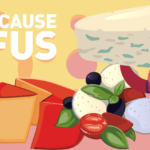Cheese Industry Stance on Temporary Block of Imports Go back »
2017-09-12 | All chapters

Background
The importation of certain types of European cheese that use particular cultures (e.g. geotrichum candidum, penicillium candidum, and penicillium camemberti) has been affected by recently strengthened regulatory measures undertaken by China to ensure food safety. In general, cultures used to produce cheese are required to comply with its GB5420-2010 cheese safety standard and/or relevant laws and regulations. The former Ministry of Health issued its List of Edible Cultures in Food in 2010, which listed all the cultures permitted to be used in foods other than infant and young child formula. The list included a footnote which stated that cultures that have been traditionally used for food production and processing could continue to be used with new cultures that are not on the list to follow the Management Measures of Novel Food. However, the cultures --geotrichum candidum, penicillium candidum, penivillium camemberti—that are traditionally used in production of cheese in Europe are not on this list.
The existing standard GB5420-2010 cheese safety standard may itself pose another problems for the importation of cheese. While this standard defines the maximum level of yeast and mould permitted, standards from other countries opt not to do so. This is because yeast and mould are often two of major elements of cheese. In 2016, the National Health and Family Planning Commission (NHFPC) noted these issues and began to revise the National Food Safety Standard for cheese. As part of this process, the European Cheese Industry Desk has already been working closely with the relevant Chinese authorities and stakeholders on the revision of these standards for more than two years.
Stance
The European Chamber recognises China’s commitment to improving food safety. However, with a strong safety record abroad, it has already been proven that cultures used in the production of cheese do not pose a problem.
In Europe, there is no official approval process for cultures used in cheese manufacture. Instead, each food business operator is responsible for the safety of products that they want to launch on the market. European cheese has been imported into China for decades without any safety issues resulting. It is now just a matter of official procedure to integrate the cultures that are used for producing certain types of cheese into China’s existing cheese safety standards, a process which has already been launched by relevant Chinese and European stakeholders.
While it adjusts its regulatory framework for cultures in the long run, in the short term we hope that China's competent authorities will allow the continued import of European cheese and accept the International Dairy Federation (IDF) and other European countries’ lists of cultures, for example the list of cultures published by the Danish Veterinary and Food Administration, as temporary official evidence for the permitted use of cultures.
For more information please contact
Xinhe Fan
- +86 (10) 64622066 ext.35
- xhfan@europeanchamber.com.cn

